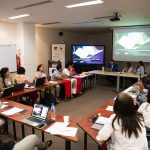Visit of the UN Rapporteur on Racism to Brazil: Systemic racism and violence against women from racial and ethnic groups are the highlights of her report
Brazil, September 02, 2024 – “Systemic racism demands systemic responses.” This approach was emphasized by Ashiwini K.P., United Nations Special Rapporteur on contemporary forms of racism, racial discrimination, xenophobia and related intolerance, during her press conference where she presented the preliminary conclusions following her visit to Brazil. Between August 5 and 16, the Rapporteur visited Brasília, Salvador, São Luís, São Paulo, Florianópolis, and Rio de Janeiro, where she met with authorities of the Federal Executive Branch and state governments, as well as with various Black, Indigenous, Quilombola, and Roma organizations.
In preparation for the visit, the Institute on Race, Equality and Human Rights (Race and Equality), together with the Institute for Development and Human Rights (IDDH), organized a virtual training with civil society organizations to support them in preparing documents with recommendations that would be delivered to the Rapporteur. In addition, the scope and objectives of the visit were presented in the training to guide them in dialogue and advocacy actions before this UN special procedure.
“The visit of the Rapporteur on racism takes place at an important moment for the country, after all, we are in an election year and advocating for intersectional public policies. From our perspective, we highlight the importance of providing Brazilian organizations with a relationship between the UN and the government, because based on the report that will be presented, the State must commit to implementing reparations in matters of racism”; highlights Rodnei Jericó da Silva, Director of Race and Equality in Brazil.
Preliminary Findings: Highlights
Race and Equality presents some of the key points of the preliminary conclusions highlighted by the Rapporteur regarding her experience in the country, which will be presented in the final report to the United Nations Human Rights Council in June 2025. This report will be delivered to the Brazilian government, which, as a member state of the UN, accepted the official visit as a way of evaluating its public policies.
In this sense, Ashiwini K.P. stressed that she identified positive points in some government actions, such as the recognition of racism as a systemic phenomenon; the creation of the Ministry of Racial Equality, the Ministry of Indigenous Peoples, and the Secretariat of Roma Peoples, within the Ministry of Racial Equality; sound affirmative policy proposals; and the existence of a health unit in Bahia for the treatment of sickle cell anemia. However, the Rapporteur emphasized that governmental progress is advancing slowly, since, recognizing that the colonialist past generates an exclusion of groups marked by structural violence, Brazil must adopt a systemic approach to guarantee restorative justice.
The lack of disaggregated data is a major issue identified by the Special Rapporteur, particularly the absence of data on Roma people, LGBTI+ people, migrants, refugees, and people with disabilities, who face multiple intersecting forms of discrimination. She also points to the growth of neo-Nazi groups, especially in Santa Catarina, where she mentioned that there is an erasure of data on the issue. Furthermore, she emphasized that Brazil must ensure that research and public policies are supported by and created through consultation with groups in vulnerable situations.
Thus, its proposals include the establishment of an independent national human rights institution following the principles on the status of national institutions for the promotion and protection of human rights (the Paris Principles), to monitor and implement anti-racist policies.
The Rapporteur emphasized that the indigenous and quilombola communities have faced numerous setbacks by the National Congress. In her criticisms, she highlighted the slowness of the State in the process of territorial demarcation of these communities; the seriousness of the time-frame thesis; environmental racism as a driver of exclusion and vulnerability; and the neglect of the health of these populations in the face of the advance of illegal mining (pesticides and urban diseases). She also expressed concern about the violence suffered by indigenous peoples and quilombolas, highlighting the recent Guaraní-Kaiowá case, in Mato Grosso do Sul, and other conflicts in Bahia. Therefore, the Rapporteur urged the Government to take an urgent position in the face of intimidation against indigenous peoples and quilombolas, warning of the seriousness of the resulting environmental violence, and that more forceful actions must be taken, in addition to emphasizing Brazil’s international commitment to Convention 169 of the International Labor Organization (ILO).
“A coordinated national plan for indigenous and quilombola affairs is necessary, as the protection of their lands is essential to address the climate crisis,” said Ashiwini K.P.
The understanding of religious racism as a practice that persecutes and reproduces violence against practitioners of African-based religions was one of the highlights of her conclusions. In this regard, the Rapporteur cited cases that came to her through civil society, such as private transport that refuses to take people in their religious clothing, the loss of custody of children by Axé women, and physical attacks organized against terreiros. In her opinion, she stressed that the State allows this type of misogynistic and racist practices and suggested that the government create a protection program to face this problem.
“Even if Dial 100 exists, the lack of investment by the state sends a message of impunity and that the government will not take any action against religious racism,” she said.
Regarding the situation of human rights defenders, the Rapporteur expressed her dismay at the seriousness of the threats and police brutality to which these groups are exposed. Although she acknowledged the importance of the creation of the Sales Pimenta Technical Working Group, to develop proposals for the National Policy and Plan for the Protection of Human Rights Defenders, she highlighted the lack of resources for human rights and the effectiveness of those policies that already exist. In this way, she urged Brazil to implement the actions recommended by the United Nations Special Rapporteur on the situation of human rights defenders, Mary Lawlor, after she visited Brazil in April of this year.
Given the situation of black women and gender/sexual intersectionality, such as with LBT women, the Rapporteur emphasized the issues of precarious access to the health system and obstetric violence, the issue of domestic workers, sexual violence, and femicide that disproportionately impacts these women, with which she pondered the need for psychological guidance as a government public policy. The Rapporteur expressed great concern about the data presented that show that black women are more exposed to femicide, highlighting the violence that occurs against black lesbian and trans women. In addition, the criminalization of abortion was noted in their evaluation, in addition to the barriers faced by women who seek even legal abortion, in accordance with the Penal Code. In this regard, she emphasized her concern about the Constitutional Amendment Proposal 1904/2024, which increases the penalties for women who have abortions to up to 20 years in prison. At this point, the importance of the Government implementing the recommendations of the CEDAW Committee, which evaluated Brazil this year, to decriminalize abortion and guarantee safe access for all people, respecting women’s rights and bodily autonomy, was highlighted. Regarding the care economy, she also noted the economic exploitation suffered by domestic workers.
Regarding police violence, the Rapporteur pointed out that Afro-descendant mothers who lose their sons and daughters due to police brutality, in addition to being victims, are also criminalized. Therefore, her report will emphasize the need for more effective measures to be taken against the prison system and, while acknowledging that the use of police cameras is an important step towards an anti-racist security policy, she pointed out that there are reports that these cameras are not used and that the government is using measures of racial discrimination without scientific basis. In this way, she urged the government to create laws on the use of artificial intelligence so that it is not used in a racist way.
The Special Rapporteur also highlighted spatial segregation, especially in large urban centers, which are mostly occupied by people of African descent and have poor access to infrastructure. In addition, she highlighted the lack of support for people living on the streets.
The advance of the extreme right and the growth of neo-Nazi cells was one of the points of extreme concern of the Rapporteur, who stressed that there is a denial by the state of Santa Catarina about these groups and that affirmative policies and actions must be implemented to strengthen local legislation to combat denialism. From this perspective, she also highlighted her concern about the lack of efforts of the Brazilian legislature in the face of bills that seek to roll back some of the rights already achieved.
Finally, she expressed concern about the growth of gender-based political violence and hate speech and urged the government to take careful measures in this area. She stressed that the low representation of vulnerable groups in decision-making spaces reflects systemic racism. In addition, this lack of representativeness can also be seen within the Judiciary.
Race and Equality thanks Ashiwini K.P. for her support and interest in the Rapporteurship’s commitment to promoting anti-racist and racial justice actions in Brazil. We highlight the importance of the recognition of religious racism as a discriminatory practice before an international human rights mechanism. We continue to fight for the defense and guarantee of human rights to confront the inequalities created by the racist system. The Brazilian State must commit itself to the demands for justice and equity of its population. A government whose proposal is “Union and Reconstruction” must have historical reparation as a priority.
Finally, we share some of the recommendations submitted to the Office of the Rapporteur on contemporary forms of racism, racial discrimination, xenophobia and related intolerance by Brazilian organizations:
- Improvement of public policies for access to legal aid and support services for victims of domestic and familial violence, based on a survey of cases registered in recent years, to support and protect women victims of violence and racism (especially religious racism); among other actions, based on the collaboration of feminist groups, religious leaders, public managers, and experts on the subject.
- Demand the implementation of the National Health Policy for the LGBTI+ Population through the creation of specialized health teams to meet the highly complex demands in the health of lesbian women;
- Recommend that the Brazilian State effectively address all barriers to justice faced by victims of racist crimes by speeding up prosecutions, revising evidence standards to strengthen accountability for discriminatory acts, and monitoring racial disparities in access to justice, especially for Afro-descendant women and LGBTI+ people.
- To ask the Brazilian State to seek to adequately implement reparation measures for victims and family members affected by State violence, which should include psychological support, medical assistance, and financial compensation, in addition to others that may be necessary in the analysis of the specific case.
- Ensure that the Brazilian State also complies with the recommendations prepared by the Committees on the Elimination of Racial Discrimination and the Committee on the Elimination of Discrimination against Women, treaty bodies that recently examined the country and noted similar concerns.
- To recommend the political participation of indigenous peoples and quilombola communities in the development of public policies that affect their territories and in policies for the defense of the environment. In addition, the Brazilian State must guarantee the demarcation and titling of quilombola and indigenous lands, in addition to rejecting the thesis of the Time-Frame Framework.














